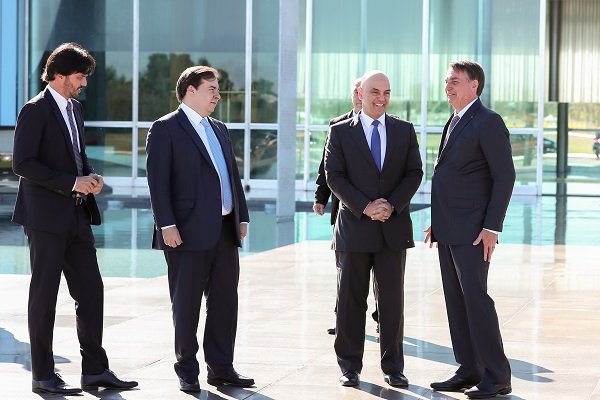In 2021, the public health in Brazil was hit by the peak of the pandemic, but a great improvement occurred after the progress of the vaccination campaign. The political scenario was shaken by the Covid’s CPI and a dispute between the Republic powers. Meanwhile, the next presidential election candidates started to appear, indicating a potentially troubled dispute. In the economy, a promising recovery has turned into a near recession.
This Content Is Only For Subscribers
To unlock this content, subscribe to INTERLIRA Reports.
HEALTH – THE PANDEMIC RECEDES BUT DOES NOT CEASE
In January, a new outbreak of Covid started, first Manaus was hit with the appearance of a local variant. Then, cases spread throughout the country. According to the Health Secretaries National Council (Conass), the peak was seen between March and April, when 539.903 new cases were reported in the week from March 21st to 27th. A bit later, from April 4th to 10th, the highest number of deaths was recorded, 21.141. Around the same period, Oswaldo Cruz Foundation (Fiocruz) recorded ICU occupation rates above 80% in almost all the states.
An improvement only came when the vaccination campaign started to accelerate. However, this took a few months. The campaign had begun on January 17th, but by March 31st, only 11% of the country’s population had received the 1st dose. High international demand for doses, shortage of vaccine inputs and local political obstacles were the major barriers. When international demand fell and local barriers were overcome, the vaccination pace improved. In August, an average of 1,9 million doses were being administered every day, and by December, 67% of the population was already fully vaccinated. This led to a great improvement of the health conditions, allowing restrictions to ease.
Despite the general positive scenario in Brazil, Health experts indicated three risks that loom on the horizon of 2022. The first is the continuous threat of new variants, such as the Omicron strain, which is already affecting Europe and the US. The second is the deceleration of the vaccination campaign and the need to reach the unvaccinated age groups to reduce the chances of new strains. The third is the new variant of the common flu H3N2, which is also overcrowding hospitals.
POLITICS – CPI, INTERNAL FIGHTS AND ELECTIONS
In the political scenario, two main points monopolized the debates in 2021: the Covid’s CPI and the internal dispute between the Republic powers. The first, the CPI, was created on April 13th to investigate the government actions to fight the pandemic and the use of federal funds by governors. After six months of work, the final CPI report was approved, 80 indictments were recommended. Fears of impeachment did not come true, despite the President’s indictment. However, there may be developments in the next year, as the report has been delivered to the Attorney General (PGR) and the Public Ministry.
The second topic originated from the dispute over authority and strategies in the fight against Covid. This ignited an institutional conflict between the Executive and the Judiciary in 2020, which extended itself to 2021. The Government and its allies kept criticizing the Supreme Court (STF), which opened inquiries into the attacks. The crisis grew, and on September 7th, under fears of institutional rupture, it reached its peak, with nationwide acts against and progovernment. Tensions were reduced only after President Jair Bolsonaro disclosed an official statement to pacify the scenario.
The year also had political maneuvers that will delineate the probable scenario of next year’s elections. In preparation for his reelection campaign, after 2 years without a party, President Jair Bolsonaro joined the Partido Liberal (PL). At the same time, his former Justice Minister, Sérgio Moro, joined Podemos party and announced that he will run for president too. Finally, after the annulment of convictions arising from the Car Wash operation against former President Lula, he also became a candidate. The three are expected to be the main candidates and their campaigns will likely exacerbate the political divisions seen in 2018.
ECONOMY AND SOCIETY – GREAT RECOVERY TURNS SOUR
Economists expected 2021 to be a great year, but things went on the opposite way. The lack of inflationary and fiscal control led to GDP contractions in two consecutive quarters and worsened social conditions.
Until November, inflation increased by 10,74% in a 12-month period. The main drivers of this were the Real devaluation and the rising commodity prices, especially of oil and its by-products, like diesel (+65%) and kitchen gas (+38%). This made life harder for the poor and led truck drivers to attempt a general strike many times. Conditions worsened with the shortage of water in the power plants reservoirs, which caused a 30% rise in energy costs.
To control inflation, the Central Bank raised the basic interest rate (Selic) to 9,25%, the highest level since 2017. Besides, to reduce the impact on popularity and on the social field, the government cut taxes on fuels and created a voucher program for gas canisters. It also exchanged the “Bolsa Família” for a new project, the “Auxílio Brasil”. However, to fund the programs, the government rose expenses and breached the fiscal limit for 2022, which hampered Selic control a little more.
For the next year, the IMF expects Brazil to grow driven by positive global demand. It forecasts a 1,5% growth in the country’s GDP. Still, local specialists believe that the nation may face a recession in 2022. This belief is based on high chances of political instability and an increase in governmental expenses, which tends to happen during electoral years.




